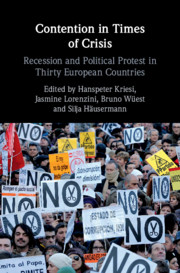Book contents
- Contention in Times of Crisis
- Contention in Times of Crisis
- Copyright page
- Contents
- Figures
- Tables
- Contributors
- Preface and Acknowledgements
- Part I A Study of Protest in Thirty European Countries
- Part II Trends in Protest in the Great Recession
- Part III Sources of Protest
- 7 Economic Grievances, Political Grievances, and Protest
- 8 Bailouts, Austerity, and Protest
- 9 Diffusion of Protest
- Part IV Interaction Between Convention and Contention
- References
- Index
8 - Bailouts, Austerity, and Protest
Representative Democracy and Policy-Making in Times of Austerity
from Part III - Sources of Protest
Published online by Cambridge University Press: 13 August 2020
- Contention in Times of Crisis
- Contention in Times of Crisis
- Copyright page
- Contents
- Figures
- Tables
- Contributors
- Preface and Acknowledgements
- Part I A Study of Protest in Thirty European Countries
- Part II Trends in Protest in the Great Recession
- Part III Sources of Protest
- 7 Economic Grievances, Political Grievances, and Protest
- 8 Bailouts, Austerity, and Protest
- 9 Diffusion of Protest
- Part IV Interaction Between Convention and Contention
- References
- Index
Summary
In the Great Recession, sovereign bailouts were deemed necessary to alleviate the stress of indebted countries. These bailouts contained some of the most contentious policies, including austerity, structural reforms, and privatizations that triggered sharp bursts of protest during the Great Recession. In this chapter, we examine the impact of those particular political events on protest within this period, aiming to assess their impact and explore the mechanisms through which they operate on protest behavior. We observe that bailouts had a strong effect on protest, but in a mostly regional pattern, as they were accompanied by massive and frequent demonstrations only in southern Europe but not in eastern Europe. We also try to see whether the effect of bailouts can be explained by a deterioration of economic sentiment, but we find that their effect on protest remains even when accounting for such a decline in prospects. The chapter then shows that bailouts, ceteris paribus, were also much more contested than non-supranational austerity packages. Overall, bailouts have a strong effect on protest, but the regional pattern suggests that this is stronger where possibilities of alternative institutional political representation were available, as in the case of Greece which is examined more closely.
- Type
- Chapter
- Information
- Contention in Times of CrisisRecession and Political Protest in Thirty European Countries, pp. 184 - 205Publisher: Cambridge University PressPrint publication year: 2020
- 10
- Cited by



